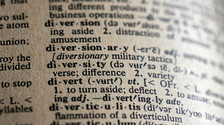Follow your HEART
He could get the perfect score.
Could it be used when he didn't get the perfect score?
-------------------------------------
If he was't late, he could get the perfect score. (In fact, he didn't get the perfect score.)
Is this sentence correct?
---------------------------------------------
Thanks in advance!!!
2 ก.ย. 2024 เวลา 4:00
คำตอบ · 9
2
You need to use perfect forms here, as they are past conditionals. Your sentence is talking about a hypothetical future.
If he hadn't been late, he could have got the perfect score.
You need these structures when you're talking about a single instance or opportunity in the past.
It is possible to use past simple in past conditionals, but only when they're habitual past (describing abilities).
He could have finished the marathon in under four hours if he had trained harder. [unreal past - single instance]
He could finish the marathon in under four hours if he trains/trained harder. [possible/hypothetical future]
He could finish a marathon in under four hours if he prepared correctly when he was younger. [past habitual]
He can finish a marathon in under four hours if he prepares correctly. [present habitual]
We use a past form for future conditionals and a perfect form for past conditionals to show that the thing is not real, rather than giving the usual time information.
If I were you ... [past form for unreal present ]
I am not you ... [present simple for real present]
If he had arrived earlier ... [perfect form for unreal past]
He arrived late ... [past simple form for real past]
... he could have passed the test. [perfect form for unreal past]
... so he didn't pass the test. [past simple for real past]
2 ก.ย. 2024 เวลา 9:56
I hope some grammar experts will add their knowledge, but here is what I think:
Your original sentence sounds a little odd to me, but it might technically be correct (change WASN'T to WEREN'T).. I can't quite pinpoint what makes it sound odd - maybe it's the use of the negative.
"If he were on time, he could get a perfect score." sounds better.
However, even if it is correct, it's a conditional about the future, not what already happened
If you are talking about the past you need something like:
"If he hadn't been late, he could have gotten a perfect score."
I suggest studying the conditionals and practicing a lot of examples. I know it's tricky, because you have to know a lot of tenses.
2 ก.ย. 2024 เวลา 4:51
Your sentence is (almost) correct but your question doesn’t make sense.
‘He could get a perfect score.’ (Better than ‘the’) is talking about the future potential. It doesn’t have anything to do with non-perfect scores that he might have gotten in the past or might get in the future.
3 ก.ย. 2024 เวลา 5:24
The only situation you cannot say "he could get a perfect score" would be when you are certain that it is never (past, present, or future) possible for him to get perfect scores.
The sentence "If he was not late, he could get a perfect score" is grammatical, whether or not he got a perfect score. In that sense, the sentence is correct. This sentence would be useful if you do not know whether he was late and you also do not know his score. If you know that he was, in fact, late, then say "if he were not late".
2 ก.ย. 2024 เวลา 11:37
RE: "He could get the perfect score."
If it's referring to the past, you could say: "He could have had the perfect score."
RE: "If he was't late, he could get the perfect score."
Better would be: If he weren't late, he could have had the perfect score.
Even though the grammar is about as good as it can get with only minor changes, it still sounds a bit uneasy, like something a non-native speaker might say. To sound more native, more effortlessly poetic, consider this alternative:
If not for his tardiness, he could have scored flawlessly.
2 ก.ย. 2024 เวลา 10:24
แสดงเพิ่มเติม
ยังไม่พบคำตอบของคุณใช่ไหม
เขียนคำถามของคุณเพื่อให้เจ้าของภาษาช่วยคุณ!
Follow your HEART
ทักษะด้านภาษา
ภาษาอาหรับ, ภาษาจีน (กลาง), ภาษาอังกฤษ, ภาษาเยอรมัน, ภาษาเกาหลี, ภาษาสเปน
ภาษาที่เรียน
ภาษาอังกฤษ
บทความที่คุณอาจชอบ

Traveling for Business: Tips, Tricks, and Essential Advice
25 ถูกใจ · 10 ความคิดเห็น

How Listening Twice Can Boost Your English Skills
51 ถูกใจ · 15 ความคิดเห็น

Top 6 Mistakes to Avoid with Vocabulary Acquisition
61 ถูกใจ · 20 ความคิดเห็น
บทความเพิ่มเติม
